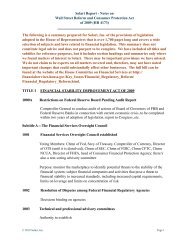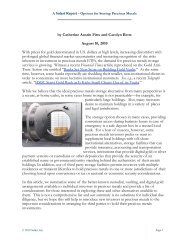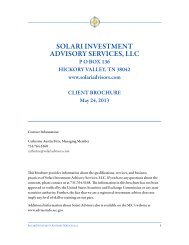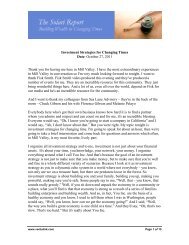Q3 01webb.qxd - Dillon Read & the Aristocracy of Stock Profits
Q3 01webb.qxd - Dillon Read & the Aristocracy of Stock Profits
Q3 01webb.qxd - Dillon Read & the Aristocracy of Stock Profits
Create successful ePaper yourself
Turn your PDF publications into a flip-book with our unique Google optimized e-Paper software.
DECADES<br />
OF INERTIA<br />
HAD CREATED<br />
A SIGNIFICANT<br />
INFRASTRUCTURE<br />
OF PEOPLE WHO<br />
MADE MONEY<br />
FROM MANAGING<br />
POVERTY—<br />
NOT ENDING IT.<br />
HUD WAS A SLUSH<br />
FUND.<br />
THE MORAL<br />
OF THIS IS<br />
SUMMED UP BY A<br />
COMMENT OF<br />
TECHNOLOGY<br />
GURU<br />
NICHOLAS<br />
NEGROPONTE:<br />
“IN A DIGITAL<br />
ECONOMY,<br />
DATA ABOUT<br />
MONEY<br />
IS WORTH MORE<br />
THAN MONEY.”<br />
S ANDERS R ESEARCH A SSOCIATES<br />
There was a direct conflict between <strong>the</strong> interests <strong>of</strong> both taxpayers and<br />
community homeowners and residents on <strong>the</strong> one hand, and <strong>the</strong> interests <strong>of</strong><br />
various intermediaries and special interests on <strong>the</strong> o<strong>the</strong>r. Decades <strong>of</strong> inertia had<br />
created a significant infrastructure <strong>of</strong> people who made money from managing<br />
poverty-not ending it. This infrastructure included contractors, property<br />
managers, not-for-pr<strong>of</strong>it institutions, mortgage bankers, investment bankers,<br />
consultants, state housing finance agencies and low income activists who made<br />
money from <strong>the</strong> average American not having access to education, jobs and<br />
capital based on performance. Performance was judged on <strong>the</strong> return on investment<br />
to special interests, not <strong>the</strong> return on investment to taxpayers. The two had<br />
devolved to a point where <strong>the</strong>y were pitted in a win-lose relationship.<br />
On <strong>the</strong> face <strong>of</strong> things, <strong>the</strong> loan sales were a grand success in <strong>the</strong> capital markets,<br />
in <strong>the</strong> technology world, in <strong>the</strong> reengineering world, and to <strong>the</strong> bottom line.<br />
Behind <strong>the</strong> scenes <strong>the</strong>y were unhelpful for <strong>the</strong> Democrats who had to raise<br />
money in <strong>the</strong> 1996 elections and to <strong>the</strong> Republicans who were putting forward<br />
Jack Kemp, <strong>the</strong> former secretary <strong>of</strong> HUD. Everyone needed more pork and<br />
patronage to hand out, not less.<br />
HUD was a slush fund. Some say <strong>the</strong> loan sales were initially used to increase<br />
slush fund resources. If Treasury colluded with Wall Street bidders, it is entirely<br />
possible to have stolen large amounts <strong>of</strong> resources without anyone on <strong>the</strong> HUD<br />
loan sales team knowing. In addition, loan sales generated <strong>the</strong> credit subsidy and<br />
high recovery rate assumptions needed to fund large increases <strong>of</strong> new originations.<br />
Were new originations needed to keep slush fund operations going? If so,<br />
once enough credit subsidy pr<strong>of</strong>its were generated to fund new originations,<br />
Wizard and <strong>the</strong> place-based trusts may have exposed slush fund operations.<br />
In <strong>the</strong> end, HUD decided to resolve its ongoing single-family mortgage defaults<br />
with a foreclosure process that rejected resolution methods that could produce a<br />
90% recovery rate. Instead, it chose a foreclosure and inventory property sales<br />
system that had historically produced 35% recovery rates. It was much more<br />
expensive for both defaulting and nearby homeowners, costing <strong>the</strong> HUD mortgage<br />
funds in <strong>the</strong> billions annually. The justification given by <strong>the</strong> deputy in<br />
charge <strong>of</strong> <strong>the</strong> single-family program was that maintaining a large foreclosed<br />
property inventory was essential to being a “full service real estate operation.”<br />
Losing billions a year so that a government agency is “full service” is bureaucratspeak<br />
that intentionally obscures o<strong>the</strong>r objectives. Pro<strong>of</strong> lay in <strong>the</strong> silence <strong>of</strong> <strong>the</strong><br />
private mortgage insurance companies and <strong>the</strong> mortgage industry. These practices<br />
were fine with <strong>the</strong>m. When <strong>the</strong> private sector concedes large market share<br />
to government graciously, something is up.<br />
THE NATIONAL SECURITY COUNCIL’S POINT OF VIEW<br />
I used to have a partner who would always say, “Cash flow is more important<br />
than your mo<strong>the</strong>r.” If you want to understand anything, sit in <strong>the</strong> top guy’s chair<br />
and simulate <strong>the</strong> cash flows. Everything becomes very clear quickly.<br />
2001 THIRD Q UARTER C OMMENTARY - PAGE 23












